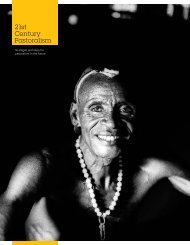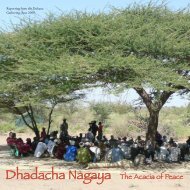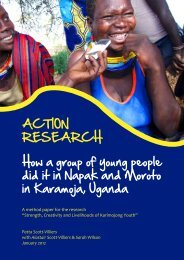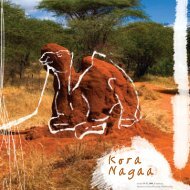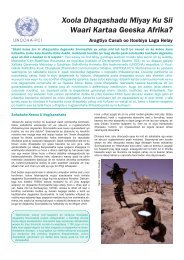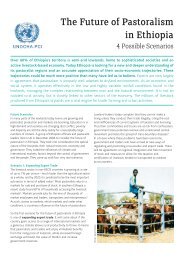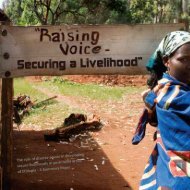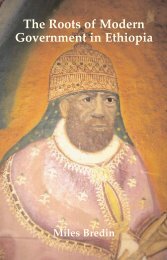Download PDF (212Kb) - the Website of the Pastoralist ...
Download PDF (212Kb) - the Website of the Pastoralist ...
Download PDF (212Kb) - the Website of the Pastoralist ...
Create successful ePaper yourself
Turn your PDF publications into a flip-book with our unique Google optimized e-Paper software.
Vulnerable Livelihoods in Somali Region, Issues Paper, March 2005<br />
Livestock Marketing<br />
Contrary to stereotypical images <strong>of</strong> pastoralists as<br />
self-sufficient nomads who depend almost entirely on<br />
<strong>the</strong>ir animals for food (meat, milk and cheese, blood)<br />
pastoralists generally depend heavily on <strong>the</strong> market.<br />
They sell livestock for cereals, o<strong>the</strong>r food and various<br />
goods and services for which cash is needed. When<br />
livestock marketing channels are disrupted for any<br />
reason, this has impacts on <strong>the</strong>ir livelihoods that are<br />
potentially as damaging as severe drought or conflict.<br />
“Poverty Cycles” or “Poverty Rachets”?<br />
When asked to assess <strong>the</strong>ir well-being status over<br />
<strong>the</strong> past 10 years, <strong>the</strong> responses <strong>of</strong> pastoralists in<br />
Gashamo reflected a high degree <strong>of</strong> livelihood<br />
volatility. Most households said <strong>the</strong>y were doing well<br />
in <strong>the</strong> mid-1990s, but <strong>the</strong> drought <strong>of</strong> 1999/2000<br />
caused a steep rise in those who were 'struggling'.<br />
This was followed by 2-3 years <strong>of</strong> recovery, before<br />
<strong>the</strong> droughts <strong>of</strong> 2003/04 devastated livelihoods,<br />
reversing <strong>the</strong> positive pattern <strong>of</strong> 10 years before.<br />
Similar trends were reported by agro-pastoralists in<br />
Kebribayah, but in urban Jigjiga <strong>the</strong>re was much less<br />
variability in self-assessed well-being over time.<br />
100%<br />
Trends in Self-assessed Vulnerability, Gashamo<br />
90%<br />
80%<br />
70%<br />
Doing Well<br />
Struggling<br />
Households (%)<br />
60%<br />
50%<br />
40%<br />
30%<br />
20%<br />
10%<br />
Struggling<br />
Doing Well<br />
Livestock owners have faced a number <strong>of</strong> shocks to<br />
<strong>the</strong>ir efforts to market <strong>the</strong>ir animals in recent years. In<br />
1997, an outbreak <strong>of</strong> Rift Valley Fever dealt a triple<br />
blow to pastoralists and livestock traders: (1) large<br />
numbers <strong>of</strong> animals died; (2) prices for livestock and<br />
livestock products collapsed; (3) Saudi Arabia and<br />
o<strong>the</strong>r Gulf states imposed a ban on livestock imports<br />
from Ethiopia. Since Somali pastoralists depend most<br />
heavily on exports to <strong>the</strong> Gulf for <strong>the</strong>ir income, this<br />
was a severe blow to <strong>the</strong>ir livelihoods, that persisted<br />
for several years.<br />
In 1999/2000 and most years since, Somali Region<br />
has been afflicted by droughts that have resulted in<br />
heavy livestock losses and have undermined <strong>the</strong><br />
wealth basis <strong>of</strong> local communities. These droughts<br />
have come in quick succession, leaving no time for<br />
herds to reconstitute.<br />
Impacts <strong>of</strong> Drought on Terms <strong>of</strong> Trade<br />
"People are dependent on animals which are<br />
affected by <strong>the</strong> drought. Most <strong>of</strong> <strong>the</strong> animals are<br />
very ill and weak, and we can no longer barter<br />
exchange a grown sheep for a 50-kilogram sack <strong>of</strong><br />
food."<br />
0%<br />
10 years ago<br />
(1994)<br />
4-5 years ago<br />
(2000)<br />
2 years ago<br />
(2002)<br />
1 year ago<br />
(2003)<br />
Today<br />
(2004)<br />
Most observers would draw one <strong>of</strong> two interpretations<br />
from this evidence. One is that rural livelihoods in<br />
Somali region are becoming increasingly unviable,<br />
and that strong intervention is needed including<br />
perhaps <strong>the</strong> 'sedentarisation' <strong>of</strong> pastoralists, to<br />
stabilise <strong>the</strong>ir livelihoods and improve access to basic<br />
services such as schools and clinics. An alternative<br />
interpretation is that <strong>the</strong> last few years represent a<br />
bad phase in <strong>the</strong> 'dynamic disequilibrium' cycles <strong>of</strong><br />
accumulation, collapse and recovery, that are normal<br />
in pastoralist systems - what is happening is a<br />
'poverty cycle' ra<strong>the</strong>r than a 'poverty ratchet'.<br />
But it is most likely that <strong>the</strong> impacts <strong>of</strong> <strong>the</strong>se recurrent<br />
shocks and stresses are differentiated, so that more<br />
resilient households will survive <strong>the</strong> downturn and<br />
recover, while o<strong>the</strong>rs have been forced down and out<br />
<strong>of</strong> pastoralism altoge<strong>the</strong>r. This has already happened<br />
for many IDPs and people who have migrated to <strong>the</strong><br />
edge <strong>of</strong> towns like Jigjiga and Gode.<br />
The Vulnerable Livelihoods in Somali Region Study was initiated by <strong>the</strong> UNOCHA <strong>Pastoralist</strong><br />
Communication Initiative (UNOCHA-PCI), in partnership with <strong>the</strong> Ministry <strong>of</strong> Federal Affairs and <strong>the</strong> Somali<br />
National Regional State. The project leader is Dr Stephen Devereux <strong>of</strong> <strong>the</strong> Institute <strong>of</strong> Development Studies,<br />
University <strong>of</strong> Sussex. For fur<strong>the</strong>r information, please contact Alastair Scott-Villiers at scott-villiers@un.org.<br />
The opinions expressed here do not necessarily reflect those <strong>of</strong> <strong>the</strong> United Nations



